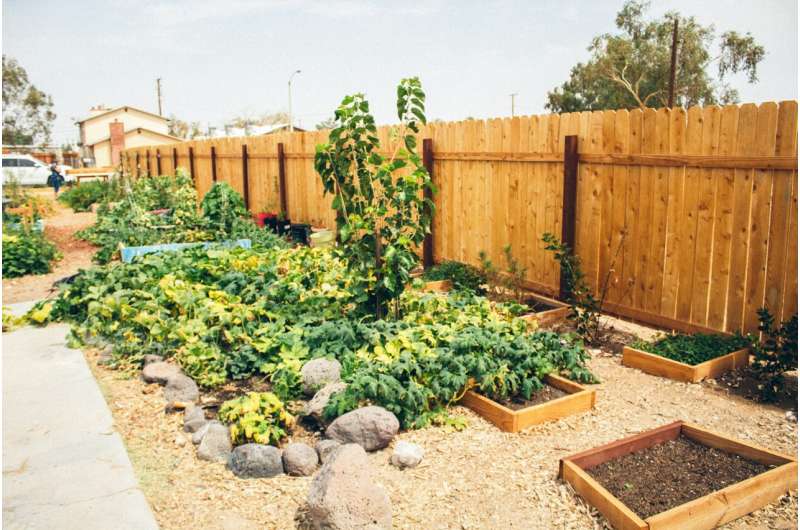This article has been reviewed according to Science X's editorial process and policies. Editors have highlighted the following attributes while ensuring the content's credibility:
fact-checked
trusted source
written by researcher(s)
proofread
Campus garden initiatives can help grow the next generation of environmental change-makers

No longer a problem of the future, the climate crisis is now driving devastating real-world impacts here in Canada and worldwide.
For many Canadians, one of the most visible climate impacts is on the availability and cost of the food we eat as climate change, global crises and profit-driven food companies have combined to drive food insecurity. The agricultural sector is simultaneously a major contributor to Canada's greenhouse gas (GHG) emissions and itself highly vulnerable to climate change.
Amid this crisis, students are sowing seeds of change on university campuses across the country.
Transformative learning and action
Student-led food initiatives like campus gardens, food waste diversion projects, and community food security partnerships are on the rise and are a proven way of localizing climate action and transforming food systems.
Given the sheer scale and complexity of the climate and food security crises, it can be tempting to doubt just how much impact these small-scale campus initiatives can have. Researchers have even criticized student gardens for entrenching shallow and depoliticized understandings of the food system among participants. After all, the GHG emissions saved by growing vegetables in one garden plot or setting up a compost program are minuscule compared to the many hundred million tons of emissions attributed to corporations.
While student-led initiatives may not directly solve the crises we face, we found they can transform students' mindsets and develop their skills and confidence as agents of larger-scale change. Our research with McGill University students participating in student-led campus- and community-based initiatives shows how these activities can support transformative opportunities for learning about, and acting on, food security and climate change.
Students have long reported that education about food and environmental issues like climate change feels abstract and disempowering within the confines of classroom walls.
The lack of real-world engagement makes it challenging for learners to discern how and where they can contribute to building solutions. Student-led food initiatives are one way that students engage with these issues through experiential learning.
Our findings
We found that initiatives that only focus on the technical or scientific aspects of food security and climate change have limited educational impact on student participants. Rather, building critical and transformative understandings of food systems in students appears to hinge on a few key practices that some, but not all, student-led initiatives address.
1. Learning and acting beyond the classroom
Through hands-on learning students gain opportunities to "learn by doing," either through course-based or extracurricular activities. This approach is especially effective when education transcends campus boundaries through partnerships with local communities and community organizations.
When immersed in hands-on and collaborative experiences with communities, students demonstrated new capacities to collectively act in small ways on large-scale issues. Connecting with partners in school and community gardens, for example, allowed students to grapple with complex issues on tangible scales and foster a deeper understanding of the challenges at hand.
2. Centering equity and justice
Building on our insights about learning in hands-on collaborations, we found that working with equity and justice-oriented partners deepened student engagement even further. For instance, collaboration with local food banks called upon students to observe, interact with, and reflect on community food insecurity and injustice, which they otherwise may not encounter within campus confines.
This direct engagement with food system realities nurtured a more complex, holistic and critical understanding of food systems issues among participants. It also inspired hope and confidence within students, motivating them to engage in further action.
3. Engaging with peers across boundaries
Our research found that student-led initiatives act as important spaces for social engagement and learning between students, creating opportunities for meaningful dialogue across academic disciplines. Social bonds were also important for motivating and strengthening collective action among students, often evoking feelings of hope. These feelings stand in stark contrast to the despair and discouragement reported by students exposed to conventional "doom-and-gloom" environmental education.
For example, in developing a workshop for a local food bank that connected composting in the community garden with climate change, students studying education and environment exchanged new understandings of the connections between climate, food and educational systems.
Supporting student learning
With the impacts of climate change only projected to grow in the years to come, educational institutions urgently need to step up to the scale and scope of the challenge.
Our findings show how investing in hands-on, justice-oriented and boundary-spanning learning opportunities helps to drive transformative learning and can nurture students as the next generation of change-makers. Universities can do this by supporting student-led initiatives through the allocation of funds, space or mentorship to these efforts, or by expanding experiential learning within academic courses and programs.
Strengthening university-community partnerships, particularly with organizations working to advance climate, social and food justice, is critical to both types of investment.
Provided by The Conversation
This article is republished from The Conversation under a Creative Commons license. Read the original article.![]()





















